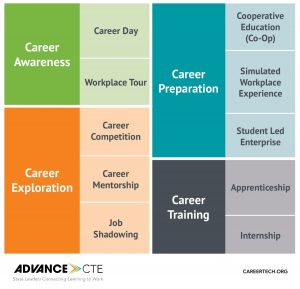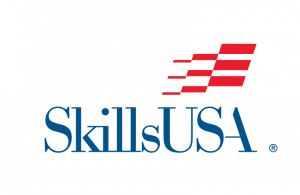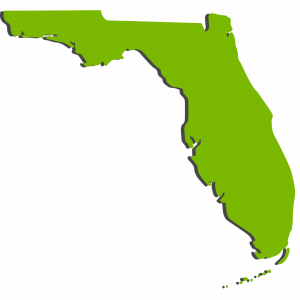 Advance CTE recently held a panel on engaging employers at this year’s Fall Meeting, bringing together experts from education, industry, and workforce development to discuss how we can better align education and industry needs, create impactful partnerships, and prepare learners for the careers of tomorrow. The bottom line? Employers are essential partners in shaping Career Technical Education (CTE).
Advance CTE recently held a panel on engaging employers at this year’s Fall Meeting, bringing together experts from education, industry, and workforce development to discuss how we can better align education and industry needs, create impactful partnerships, and prepare learners for the careers of tomorrow. The bottom line? Employers are essential partners in shaping Career Technical Education (CTE).
Building Bridges Between Education and Industry
We need to bring education and industry closer than ever. As Kevin Imes, Arizona State CTE Director, emphasized, “Employers and educators need to be at the table together—at these conferences and beyond these walls.” The panelists highlighted the need for more proactive efforts to align curriculum with the actual skills and competencies that employers are looking for.
From a state perspective, Kevin Imes shared how Arizona is working to bridge this gap through its Education Economic Commission, which is renewing and reinventing career pathways to better align with industry needs. This effort includes facilitating more direct communication between industry and education to ensure that career pathways are not only relevant but also responsive to the dynamic labor market.
When Should Employer Engagement Start?
 According to our panelists, the earlier, the better —ideally during the Career Awareness and Career Exploration stages, well before learners enter the workforce.
According to our panelists, the earlier, the better —ideally during the Career Awareness and Career Exploration stages, well before learners enter the workforce.
Dr. Joy Rich, Manager of Workforce Development and Community Relationships at Nissan North America, shared how Nissan is taking proactive steps to engage learners through their Nissan Technician Training Academy (NTTA). Through this program, learners gain hands-on experience in automotive diagnosis and repair, preparing them for careers as factory-trained technicians at Nissan and Infiniti dealerships. These types of training programs provide learners with a clear pathway to well-paying, in-demand, and stable careers right out of high school, showing how early employer engagement can make a big difference.
Durable Skills Are Essential
A major theme from the session was the increasing importance of durable skills in today’s workforce. Employers like Patti Taylor, Director of Student Health Careers at Banner Health, discussed how competencies like critical thinking, problem-solving, and the ability to adapt to emerging technologies such as AI are becoming just as essential as technical skills. In fields like healthcare and IT, where new technology is constantly evolving, employers are looking for workers who can perform technical tasks and think critically and adjust to new challenges. This insight is invaluable for educators who are preparing learners for the realities of the workplace.
Real-World Skills, Real-World Partners
A standout example of how employers can create strong partnerships with education institutions came from Nissan’s Center of Excellence, which is deeply involved with initiatives like SkillsUSA and Nissan University. These collaborations help learners gain industry-specific certifications and participate in apprenticeship programs, all while building strong relationships between education providers and employers. Dr. Rich emphasized that “being skills-based over degree-based removes those barriers to entry,” making it easier for students to find success in fields that align with their interests and abilities.
Employers also play a crucial role in identifying skill gaps in CTE spaces. As Patti Taylor pointed out, employers should take a hands-on approach to shaping curricula, working directly with educators to ensure that the learners’ skills match the job requirements they will face in the real world. For example, industry day visits to schools—where employers showcase lesser-known career opportunities in fields like IT and finance within healthcare—help learners better understand the breadth of career options available to them.
Navigating Liability and Legal Barriers in Work-Based Learning
Dr. Rich shared valuable advice on how employers and education leaders can work together to overcome the barrier of liability in work-based learning, suggesting that schools and employers bring labor law expertise into the conversation early on. According to a 2023 report from the National Apprenticeship Training Foundation, over 40% of employers cite concerns about liability as a barrier to offering internships or apprenticeships. Legal ambiguities related to worker classification and wage laws often contribute to this hesitation. Understanding the legalities of internships and apprenticeships ensures learners can gain valuable experience without risking exposure to unnecessary liability issues.
The Big Takeaway: Collaboration is Everything
The big takeaway for state CTE leaders and educators? Keep building strong, ongoing relationships between industry and education. As Dr. Rich said, “Be that aggregator, be that branch because industry partners want to work with you, but the barriers need to be removed.” When asked what one word they’d leave the audience with, all the panelists agreed—collaboration.
 In workforce development, education and industry partnerships help to align curriculum with industry needs, provide opportunities for real-world experience, and focus on skills over degrees to ensure that learners are not only ready for the workforce but are equipped to thrive in it.
In workforce development, education and industry partnerships help to align curriculum with industry needs, provide opportunities for real-world experience, and focus on skills over degrees to ensure that learners are not only ready for the workforce but are equipped to thrive in it.


 As the leading workforce development organization for learners, SkillsUSA is proud to be leading the way to help America’s future workforce. Approaching our 65th anniversary in 2030, we continue to focus on preparing learners for careers in trade, technical, and skilled service occupations. With the support of over 850 national partners, SkillsUSA is committed to addressing our nation’s workforce challenges with bold solutions and steadfast dedication.
As the leading workforce development organization for learners, SkillsUSA is proud to be leading the way to help America’s future workforce. Approaching our 65th anniversary in 2030, we continue to focus on preparing learners for careers in trade, technical, and skilled service occupations. With the support of over 850 national partners, SkillsUSA is committed to addressing our nation’s workforce challenges with bold solutions and steadfast dedication. 

 This week the Senate remained in session for a few days of final work ahead of its annual August recess period. Lawmakers in the House recessed early last week and both chambers are expected to return to Capitol Hill in early September. As shared previously, the House has passed nearly half of the annual federal fiscal year 2025 (FY25) appropriations measures that compose the federal budget. The Labor-HHS-ED funding bill, which provides federal resources for the Carl D. Perkins Career and Technical Education Act (Perkins V) and other critical education and workforce development programs, was recently
This week the Senate remained in session for a few days of final work ahead of its annual August recess period. Lawmakers in the House recessed early last week and both chambers are expected to return to Capitol Hill in early September. As shared previously, the House has passed nearly half of the annual federal fiscal year 2025 (FY25) appropriations measures that compose the federal budget. The Labor-HHS-ED funding bill, which provides federal resources for the Carl D. Perkins Career and Technical Education Act (Perkins V) and other critical education and workforce development programs, was recently  This includes limiting the ability of social media companies to target advertisements toward young people. Despite the broad bipartisan Senate support for both measures, it remains unclear at this time whether the House will consider the legislation when lawmakers return in September.
This includes limiting the ability of social media companies to target advertisements toward young people. Despite the broad bipartisan Senate support for both measures, it remains unclear at this time whether the House will consider the legislation when lawmakers return in September.  In the aftermath of the coronavirus pandemic, the strains on the healthcare system continue to be felt, with
In the aftermath of the coronavirus pandemic, the strains on the healthcare system continue to be felt, with Florida
Florida  In Washington,
In Washington,  Wisconsin
Wisconsin  Some states focus on a broad strokes approach that expands access to the sector as a whole. Last year,
Some states focus on a broad strokes approach that expands access to the sector as a whole. Last year,  Other states developed more focused career-specific pathways in close collaboration with industry partners.
Other states developed more focused career-specific pathways in close collaboration with industry partners. 
